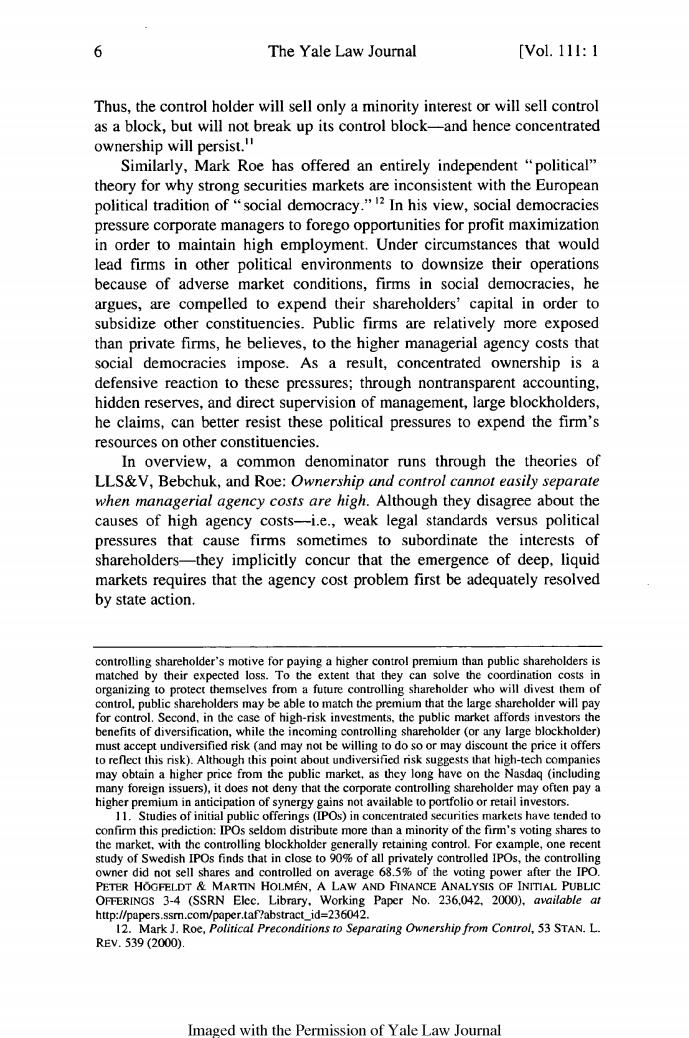正在加载图片...

6 The Yale Law Journal [Vol.11:1 Thus,the control holder will sell only a minority interest or will sell contro as a block,but will not break up its control block-and hence concentrated ownership will persist." Similarly,Mark Roe has offered an entirely independent"political" yfor why strorket cor ent with the European political tradition of "social democracy." pressure corporate managers to forego opportunities for profit maximization in order to maintain high employment.Under circumstances that would ead firms in other political environme nents to downsize their ope rations because of adverse market conditions,firms in social democracies,he argues,are compelled to expend their shareholders'capital in order to subsidize other constituencies.Public firms are relatively more exposed than s he helie tothe higher managerial agency cost that As a result, concentrated ownership is a defensive reaction to these pressures;through nontransparent accounting. hidden reserves,and direct supervision of management,large blockholders, he claims,can better resist these political pressures to expend the firm's urces on other constituencies In overview,a common denominator runs through the theories of LLS&V,Bebchuk,and Roe:Ownership and control cannot easily separate when managerial agency costs are high.Although they disagree about the causes of high agency costs ie weak legal stand ards ve sus political pressures that cause firms sometimes to subordinate the interests c shareholders-they implicitly concur that the emergence of deep,liquid markets requires that the agency cost problem first be adequately resolved by state action. reholder's m ve fo e a highe um than public shareholders i their To the extent that they can solv coon ers may be able to match the um that the laree sh holder will aacepundeicd nd may not may obtain a higher price from the public market.as they long have on the Nasdaq(including pation of gainsnoraaibe n pay a Stndiesofinitialpbicofienings s)in conce of the kholder tainin control one es and controlled on av 68.5 of the yoting MEN abstr REV.5392000 Separating Ownership from Conirol,53 STAN.L Imaged with the Permission of Yale Law JournalThe Yale Law Journal Thus, the control holder will sell only a minority interest or will sell control as a block, but will not break up its control block-and hence concentrated ownership will persist."' Similarly, Mark Roe has offered an entirely independent "political" theory for why strong securities markets are inconsistent with the European political tradition of "social democracy." "2 In his view, social democracies pressure corporate managers to forego opportunities for profit maximization in order to maintain high employment. Under circumstances that would lead firms in other political environments to downsize their operations because of adverse market conditions, firms in social democracies, he argues, are compelled to expend their shareholders' capital in order to subsidize other constituencies. Public firms are relatively more exposed than private firms, he believes, to the higher managerial agency costs that social democracies impose. As a result, concentrated ownership is a defensive reaction to these pressures; through nontransparent accounting, hidden reserves, and direct supervision of management, large blockholders, he claims, can better resist these political pressures to expend the firm's resources on other constituencies. In overview, a common denominator runs through the theories of LLS&V, Bebchuk, and Roe: Ownership and control cannot easily separate when managerial agency costs are high. Although they disagree about the causes of high agency costs-i.e., weak legal standards versus political pressures that cause firms sometimes to subordinate the interests of shareholders-they implicitly concur that the emergence of deep, liquid markets requires that the agency cost problem first be adequately resolved by state action. controlling shareholder's motive for paying a higher control premium than public shareholders is matched by their expected loss. To the extent that they can solve the coordination costs in organizing to protect themselves from a future controlling shareholder who will divest them of control, public shareholders may be able to match the premium that the large shareholder will pay for control. Second, in the case of high-risk investments, the public market affords investors the benefits of diversification, while the incoming controlling shareholder (or any large blockholder) must accept undiversified risk (and may not be willing to do so or may discount the price it offers to reflect this risk). Although this point about undiversified risk suggests that high-tech companies may obtain a higher price from the public market, as they long have on the Nasdaq (including many foreign issuers), it does not deny that the corporate controlling shareholder may often pay a higher premium in anticipation of synergy gains not available to portfolio or retail investors. 11. Studies of initial public offerings (IPOs) in concentrated securities markets have tended to confirm this prediction: 1POs seldom distribute more than a minority of the firm's voting shares to the market, with the controlling blockholder generally retaining control. For example, one recent study of Swedish IPOs finds that in close to 90% of all privately controlled IPOs, the controlling owner did not sell shares and controlled on average 68.5% of the voting power after the IPO. PETER HOGFELDT & MARTIN HOLMEN, A LAW AND FINANCE ANALYSIS OF INITIAL PUBLIC OFFERINGS 3-4 (SSRN Elec. Library, Working Paper No. 236,042, 2000), available at http://papers.ssrn.com/paper.tafabstractid=236042. 12. Mark J. Roe, Political Preconditions to Separating Ownership from Control, 53 STAN. L. REv. 539 (2000). Imaged with the Permission of Yale Law Journal [Vol. 111: 1